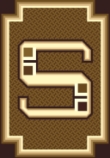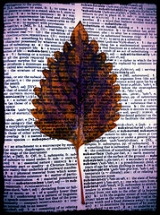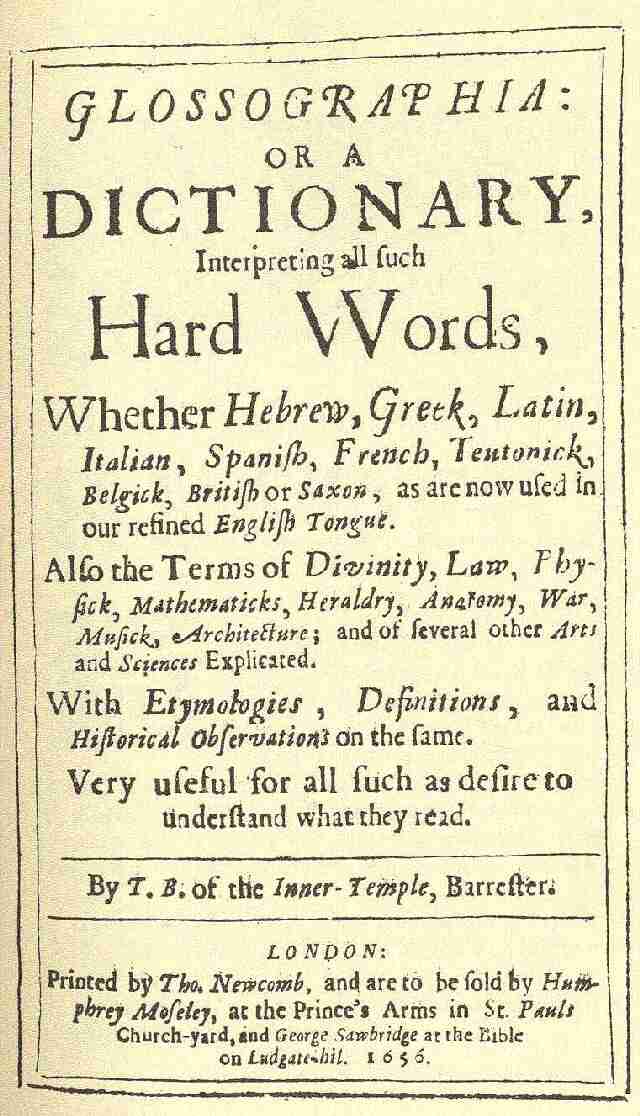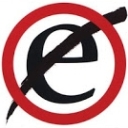
.
Compendium of Lost Words
What is a Lost Word?
| A-E | F-M | N-R | S-Z | Index |
There are rare words, and there are rarer words, but only a very special word qualifies as a bona fide lost word. Of course, no word in the Compendium can be completely lost, or I could never have found it. To as great an extent as possible, I have tried to use a set of criteria by which truly rare but real English words can be classified as lost words. They are as follows:
1. The word must have a header entry in the Oxford English Dictionary.
Every single one of the words in this list is found in the Oxford English Dictionary. Using the OED online subscription service, I have tracked down these words. The OED is the largest English dictionary, and is generally regarded as a canonical source for the study of the language.
2. The word may not appear in its proper English context on any readily accessible web page.
Using the Google search engine, I have ensured that none of these words appear on any English-language web page in its proper context. Many of these words turn up no hits whatsoever. Others occur only as part of long alphabetic word lists that lack definitions. Still other pages (often pornographic websites) use scripts that automatically interpolate any keyword from such word-lists in a futile effort to attract more traffic. Others are legitimate words in a foreign language, or are place-names or proper nouns in English. None of these 'hits' excludes a word from status as a 'lost word'. However, if even one hit was returned where the word was defined, or where it was used in its proper sense in a sentence, it was excluded. Because the online OED is subscription-based , it is not indexed by the search engines and thus its definitions do not show up in search engines.
3. The word must have been used in Modern English.
The question of what exactly constitutes 'Modern English' is tricky, and any answer must necessarily have an element of arbitrariness. Some linguists distinguish only Middle English from Modern English, while others use an intermediate category, Early Modern English, which includes, among other things, the writings of Shakespeare, Spenser, and the King James Bible. I have chosen a cut-off date of 1650 as the earliest limit of true Modern English, following the classification used by some linguists. Because the OED contains dated usage sentences for every word it defines, including its earliest use and later uses throughout its history, it was relatively easy for me to distinguish those words used since 1650 and those that died out earlier. Not entirely coincidentally, this border date of 1650 is just barely early enough to allow entries from the first large English-only dictionary, the very interesting Glossographia (1656) by Thomas Blount.
4. The word must have been used in a standard English variety rather than simply in a regional dialect.
There must be literally thousands of dialectal English words used since 1650 that have never been used online. Most numerous among these are probably Scots dialectal terms. While I am not a linguistic prescriptivist, and do not think in any way that Scots, Australian, Indian and other English dialects are in any way inferior, they are really another subject entirely, and don't belong in this inquiry. By 'standard' English, I mean words that appear in print in British or American English, the major varieties of the language as used today.
5. The word must not be a simple variation in spelling of another word.
Particularly in the early part of the 'modern' period from which my words are drawn, English spelling was far from regular. The OED, along with many other dictionaries, includes such spelling variations when they are used with some frequency and are not idiosyncratic errors. While these variations are of interest to lexicographers, they are not particularly interesting from the perspective of this study, since their more ordinary versions will be found online in many places.
In addition, there are many criteria that identify a truly ideal lost word, but do not apply to all the words in the Compendium. Ideally, a word should not be a nonce-word or an idiosyncratic coinage, and, even better, should have been used by two or more authors. Words whose meanings do not relate to entirely obsolete concepts are preferred over those that could only be used historically. Lastly, though these gems are quite rare, twentieth century words that meet all the other criteria are especially desirable.
I hope you have found this site to be useful. If you have any corrections, additions, or comments, please contact me. Please note that I am not able to respond to all requests. Please consult a major dictionary before e-mailing your query. All material on this page © 1996-2021 Stephen Chrisomalis. Links to this page may be made without permission.
| A-E | F-M | N-R | S-Z | Index |








